#restrictive and restrictive and repetitive behaviors
Text
Autism & Anger Rumination
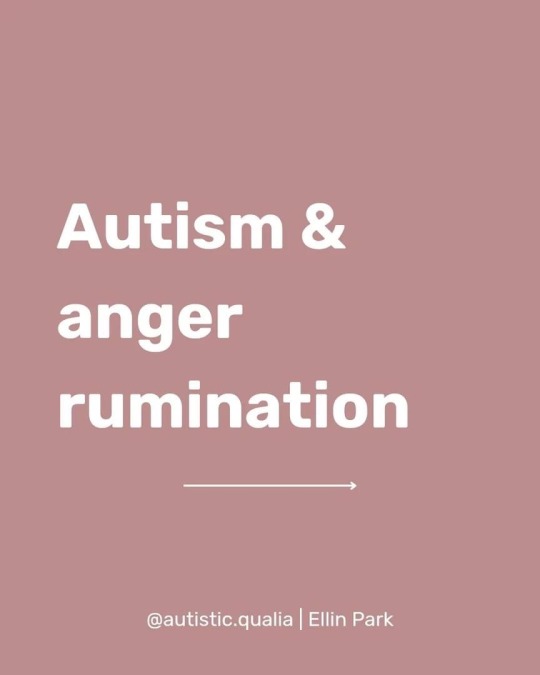




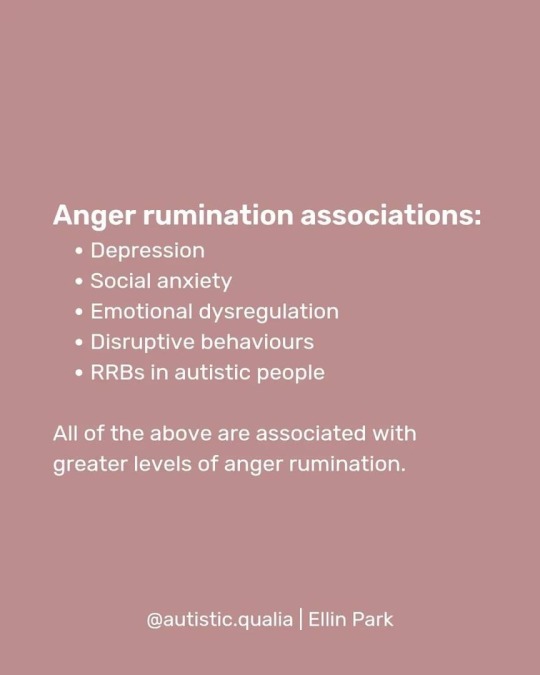
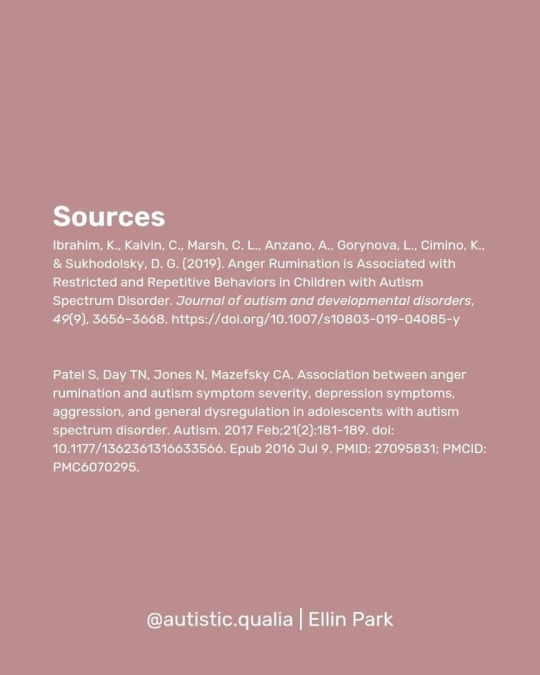
Autistic Qualia
#autism#actually autistic#autism awareness month#autism acceptence month#autism and anger#anger rumination#deppresion#social anxiety#emotional dysregulation#disruptive behaviors#RRBs in autistic individuals#restrictive and restrictive and repetitive behaviors#neurodivergence#neurodiversity#actually neurodivergent#feel free to share/reblog#Autistic Qualia (Facebook)
785 notes
·
View notes
Note
OCD is pretty common among autistic people, and many of us who dont have full-on OCD may experience some things that can be kinda similar to some aspects of it. I'm on the spectrum myself and i also have this issue of basically getting stuck on some thoughts. It sucks, sometimes it's something that makes me angry but doesnt actually matter that much in the grand acheme of things and i just end up in a bad mood over something stupid and cant stop thinking abt it for a few days even though there are no new thoughts about it, i just keep going through old ones again and again and again. I dont know if there's a term for it, but hey, at least I'm not the only one, and neither are you. Generally i just look for distractions and wait until the thoughts get less obsessive and annoying
That makes sense, thanks!
#logically i kno theres a spectrum of experience from autistic restrictive and repetitive behavior to full on ocd and im an ecologists so i#kno natrue does not give a damn abt human boxes and labels but unfortunately if u give me a set of labels i will obsessively try to parse#out what fits into what best and it drives me nuts. which is probably part of why i fall into the 0cd side of things. all of my thoughts#tend to b looping a repetitive and it makes me freak the fuck out lol. im also supposed to ground myself and move on which is hard to do#rn i think abt ice floating down a channel. floating down the northwest passage bc im again an obsessional freak#but that seems to help a bit lowering my distress. i need to pull myself out of my own head and into the present. mindfulness as my#therapist would say. and im trying but its hard and i hate it lol. eventually itll get easier tho. one hopes at least#to b fair im way more chill abt this categorical debate than parsing whether or not im bip0lar lol bc that comes with meds#and im spectacular at talking myself out of medication and i kno that and the doctors kno that but they dont say it directly and im like bro#its fine i kno what ur thinking and ur right but also im insane in a way that makes me ridiculously well informed so im a disaster#i walk in like im colaborating on a research project which tbh is probably a good thing bc i hold all the info#unrelated
15 notes
·
View notes
Text

大人の発達障害やアスペルガーとか自閉症スペクトラム概念無い幼い頃の毎日来る暗闇の夜の恐怖。戦慄の天井の隅。生まれつきの自閉スペクトラム症ASD,光るもの熱中DSM-5診断基準で闇に輝く昭和レトロなネオンやヘッドライト,街灯。自閉症こだわり常に過緊張高不安の中で見る影へ伸びる繊細微妙な光加減
#toyeye#autism spectrum disorder#high functioning autism#childhood memories#dark night#restricted repetitive behaviors#obsession with light
2 notes
·
View notes
Text
I've reached 35 responses! They're very interesting, but the sample size is still small, and I don't think it's at all representative of the Tumblr autism community. If I can't reach at least 100 responses, I don't think I'll be able to analyze Tumblr community views on support needs in depth. I'll still post descriptive statistics for the overall sample, but I won't have the statistical power to do anything else.
I'd really appreciate if everyone could help by taking the survey and reblogging this post to their followers!
As a reminder, the survey is meant to understand how people use support needs labels. For example, what makes someone low support needs and not moderate support needs? The survey also helps show what the community is like in general in terms of demographics and experiences!
A summary of the current survey results are under the Read More. Again, especially if a community that you're in is under-represented, please help by spreading the survey link! I'd especially love to hear from more people AMAB, racial/ethnic minorities, people who are not yet diagnosed or were diagnosed as adults, and higher support needs individuals!
Age: Most participants are young; 60% are under age 25%, and 20% are under 18.
Gender: Over half of the sample is AFAB nonbinary, almost 1/3 is trans men, and almost all of the remainder (14%) is cis women. Only 2 people who are AMAB have taken the survey.
Race/Ethnicity: Non-Hispanic White people are very over-represented, making up 82% of the sample.
Diagnosis: 57% are professionally diagnosed, 20% are informally or soft-diagnosed, and 14% are seeking a diagnosis. Only 9% are neither diagnosed nor seeking a diagnosis.
The most common diagnoses are ASD with no level (33%), level 1 ASD (25%), and "mild autism" (13%).
16% were diagnosed before age 8, 24% between ages 9 and 15, 32% between ages 16 and 18, 12% between ages 19 and 25, and 16% over age 25.
Autism Support Needs: The most common self-identified support needs label is "low-moderate" (43%), followed by low (23%) and moderate (14%). Most would benefit from but do not need weekly support (31%), only need accommodations and mental health support (17%), or rarely need any support (6%).
Autism Symptoms: On a severity scale of 0 (not applicable) to 3 (severe), the average is 1.7 overall, 1.8 socially, and 1.7 for restricted-repetitive behaviors. The most severe symptom is sensory issues (2.1), and the least severe are nonverbal communication and stimming (both 1.5).
83% are fully verbal, and 97% have no intellectual disability.
38% can mask well enough to seem "off" but not necessarily autistic. 21% can't mask well or for long.
Most experience shutdowns (94%), difficulties with interoception (80%), meltdowns (71%), alexithymia (71%), echolalia (69%), and autistic mutism (66%). Very few experience psychosis (14%) or catatonia (11%).
Self-Diagnosis: 20% think it's always fine to self-diagnose autism, 29% think it's almost always fine, 31% think it's only okay if an assessment is inaccessible, 71% think it needs to be done carefully, and 11% think it's okay to suspect but not self-diagnose.
15% think it's always fine to self-diagnose autism DSM-5 levels (including if the person has been told they don't have autism), 15% think it's fine as long as autism hasn't been ruled out, 21% think it's almost always fine, 18% think it's only okay if an assessment is inaccessible, 36% think it needs to be done carefully, and 36% think it's okay to suspect but not self-diagnose.
26% think it's always fine to self-diagnose autism support needs labels (including if the person has been told they don't have autism), 29% think it's fine as long as autism hasn't been ruled out, 37% think it's almost always fine, 29% think it's only okay if an assessment is inaccessible, 43% think it needs to be done carefully, and 6% think it's okay to suspect but not self-diagnose.
Disability: 71% feel disabled by autism, 17% feel disabled by another condition but not autism, and 11% are unsure.
Comorbidities: The most common mental health comorbidities are anxiety (68%), ADHD (62%), and depression (56%).
The least common mental health disorders are schizophrenia spectrum disorders (0%), bipolar disorders (3%), tic disorders (6%), substance use disorders (6%), personality disorder (9%), and OCD (9%).
The most common physical health comorbidities are gastrointestinal issues (29%), connective tissue disorders (29%), autoimmune disorders (24%), neurological disorders or injuries (24%), and hearing/vision loss (24%). All others are below 20%.
Overall Support Needs: When considering comorbidities, the most common self-identified support needs label is moderate (37%), followed by low-moderate (31%) and low (17%).
#autism#actually autistic#actuallyautistic#level 1 autism#level 2 autism#level 3 autism#low support needs#moderate support needs#medium support needs#high support needs
298 notes
·
View notes
Text
this is going to be a long post, it's kinda just me writing all my raw unfiltered thoughts on ABA therapy as someone who actually went through it
-> TW for ABA therapy, child abuse, suicide <-
I was functionally diagnosed with autism at the age of 3 but it wasn't until I was 13 that I was actually formally evaluated for it and given an official diagnosis. I was behind in social skills and developmental skills

[ID: "was also described as a sensory seeker. She does not currently have any friends and has struggled to make and maintain peer relationships throughout her childhood. Difficulties with social skills were initially noted when she was in preschool (years before the onset of clinically significant symptoms of anxiety and"]

[ID: "Social functions: [blank]'s mother also completed a questionnaire rating her social responsiveness. Her responses on the SRS-2 indicated that [blank] is demonstrating severe deficits in the areas of Social Communication (reciprocal social interaction and nonverbal and verbal communication), Social Motivation (motivation to engage in social-interpersonal behavior) and Social Awareness (perceiving social cues) and moderate deficits in the areas of Social Cognition (understanding social cues). Severe Repetitive and Restrictive Behaviors (stereotypical behaviors or highly restricted interests) were also reported. The total T-score on the SRS-2 indicates severe deficiencies in reciprocal behavior that are likely to result in interference in everyday social interaction"]

[ID: "%ile) are mildly impaired, while her social skills are moderately impaired (2nd %ile). By domain, demonstrates mildly to moderately impaired abilities in six adaptive skills areas, including self care (9th %ile), communication (5th %ile), home living (5th %ile), self-direction (2nd %ile), social (2nd %ile), and leisure (1st %ile)"]
and ultimately all this ended up with the number one recommendation after my autism evaluation being for ABA therapy.

[ID: "Recommendations: Based on the above results, the following recommendations are made for [blank] and her family.
1. ABA therapy: [blank] May benefit from an intensive treatment program to foster cognitive and communication skills, improve independence and adaptive functioning, and help manage interfering behaviors (i.e home-based, 1:1 instruction, task analysis, etc.) Most private and community programs are based on principals of operant conditioning and taught in home with 1:1 instruction"]
*I'm getting misgendered here. my pronouns are he/him
"operant conditioning"-- like a dog 🐕🐕. woof woof.
my mom didn't know any better so she put me in ABA therapy with the Center for Autism and Related Disorders. she regrets this. I regret this more.
my autism evaluation was cruel, it dissected all my flaws as if I was a bug under a microscope in a highschool laboratory. my evaluation was passed around to ABA therapists, a line of high schoolers peering through the microscope examining the most vulnerable parts of me.
and I choose the highschool analogy quite deliberately. most of the ABA therapists at my center were recent highschool graduates with no degree and little training. they knew nothing about autism and had no qualifications. you need more certificates to become a professional dog trainer than to become a professional human trainer.
"operant conditioning"
and I wish I could say it was just a poor choice of words but ABA therapy was dog training for children. my dad used to call me an "it" and somehow I felt less dehumanized by that than the entire experience I had in ABA therapy.
I was the oldest person at my center (I did not receive in home therapy) with the next oldest being approximately 3 years younger than me. at the time I felt babied. I was surrounded by 5 year olds and I was treated as if I was not just a 5 year old but an autistic 5 year old and anyone who has been a visibly autistic 5 year old knows what that feels like. I had escaped being an autistic child and now I was being treated like one again. The head of the program tried to console me by telling me adults received their services too.

[ID: "Following the principles of applied behavior analysis, CARD has developed a treatment approach for children and adolescents with"]
this was the first lie they told me. CARD does not work with adults.
I was not allowed the privileges of being a 13 year old. because I was an autistic 13 year old and therefore I was the equivalent of a 5 year old. I was in psychotherapy at the same time and I had grown very accustomed to some level of freedom in therapy. I was allowed to use the bathroom independently. in ABA therapy I was not allowed to use the bathroom independently. I tried once, me and my therapist were on an "outing" to the grocery store and I told my therapist I was going to the bathroom and walked off and I got a very stern talking to about how I needed to "stop eloping" and if I didn't stop it would "become a behavior"
eloping became a common theme used to control me and squeeze money out of my parents.
out of everything I hated in my life, including severe physical abuse at home (which they did not report), I hated ABA therapy the most. I would repeatedly make serious threats of suicide to try to get out of ABA. no one cared. everyone thought I was being dramatic but there were times I wrote out suicide notes and ABA was among the reasons I listed. ABA made me feel hopeless, depressed, revolting, disgusting, inferior, and less than human. between ABA, my home life, and my social life I had never felt so hated and it was boiling through my skin. I acted out, I was bullying people, I was behaving recklessly, I was starting fights, and all this only made the oppressive force of ABA crack down on me harder. I was a cat hissing in the corner begging to be left alone and ABA brought a net to try to tame me further. every time I scratched back it was listed as a reason I needed to be there.
I was "disruptive" and "rebellious" and "uncooperative" and "resistant to treatment" and no one could figure out why I was "regressing" despite me shouting the answer. I was screaming and no one was willing to hear me
I hated myself and my autism. my autism diagnosis made me want to die. I didn't feel freed by it or understood I felt ashamed and disgusted. I felt incompetent and like I had failed. I was ashamed to be at ABA, it was my biggest secret. I'd lie to my friends about why I couldn't hang out and I'd lie to people in public about who the woman I was with was and I'd lie about all of it to try to cover up my most shameful secret.
ABA therapy did nothing but foster this. In ABA therapy I was mocked for being autistic and what was happening only clicked when a young kid, maybe only 4 or 5, was flapping his hands and a therapist took out her phone and recorded him. we were circus animals. it was all an entertaining show to them while they poked and prodded at us with metaphorical hot irons to make us dance. the first time a therapist laughed at me for rocking back and forth I wanted to throw up. I almost did. it was systematic bullying of children I was forced to watch and experience.
my point is: the last place on earth I wanted to be was the ABA center.
so of course I tried to leave. my mom would bring me McDonald's and I'd beg, sobbing real tears, to leave early because only she could sign me out. every time I'd go to meet her I'd be marked as "eloping" and my hotel stay in hell would get extended.
my natural response to a stressful environment (leaving) was pathologized. I was eloping this way and that way and never once did I actually, truly elope. that word was a weapon used against me. they used my "elopement" to justify extending my stay to my parents. they ate it right up.
they argued I needed to stay there because I was making friends. this was true, I'm great at getting along with children it's part of why I want to go into pediatrics, but I had also made real friends with people my age at my highschool. ABA was getting in the way. I wanted to spend time with my friends outside of school but ABA took up all my time from the minute I left school to 6pm and all day on weekends. I was doing a full time job's worth of hours. I complained about how I was missing out on spending time with my real friends (as in, over the age of 7) and I was met with almost no wiggle room in my schedule. I was allowed to pre-plan time to spend with friends but every time my friend group wanted to do something spontaneously? I had to say no, and I had to lie about why. my friends would share stories about driving around town with 2 people in the group stuffed in the trunk, of hanging out in the woods together, of taking part in ordinary highschool activities as ordinary high schoolers and it made me cry because I was not an ordinary highschooler and I was not allowed to participate in ordinary highschool activities. I was one of those weird, unpleasant, socially awkward autistic people instead. eventually, they just stopped inviting me. I was forced into the out group by ABA.
I'll never get that back. I'll never get a chance to be a normal highschooler ever again.
when I did have time available to hang out with people I never had the energy to. at the time I was living with an undiagnosed physical disability and I was begging to see a doctor but no one would believe that it wasn't just anxiety. the people who believed me least of all were the people at the center.
I was constantly told I was trying to get out of therapy by "feigning" very real pain and fatigue. I tried to explain spoon theory, and that I had limited spoons, and in response they made a task for me to name things to "regenerate spoons" that's not how it works. I wasn't the only physically disabled person there. there was a wheelchair user who was constantly forced to stand for periods of time despite being in agony doing it. he wasn't allowed rewards until he did it.
rewards were used to train us like dog treats are used with dogs. sometimes the treats were fun! I'd get to cook, play Mario kart, and go on outings. other times the treats were "using the correct name and pronouns for me." I'd constantly be threatened with deadnaming and misgendering if I was being "noncompliant."
misgendering because of my autism was a theme in my life. my neuropsych evaluation report misgendered me. my parents misgendered me. the staff at ABA misgendered me. at one point the head of the program suggested that my "gender confusion" was because of my autism. my abusive father latched onto this and still claims that the reason I'm "confused" about my gender is because the evil transgenders tricked me into thinking I'm one of them because I'm autistic and therefore easily impressionable.
the two therapists I had were nice because I refused to work with the others. they weren't on a power trip and both eventually left because they realized the harm the organization was doing. other therapists were not so kind. other therapists were on a power trip, because in their mind lording over autistic 5 year olds (and autistic 14 year olds) makes them powerful and strong. occasionally I'd get stuck with one of the other therapists when my usual therapists were out. they would talk to me in a baby voice. they would make fun of me for rocking back and forth, for not making eye contact, for talking about Skyrim "too much" and generally just for being autistic.
I never really knew what I was supposed to be doing, just that I was doing it wrong. the therapists there rarely actually told me what my tasks were they'd just mark yes or no on them, judging me for something I wasn't aware of. I was never actually supposed to graduate, I was never supposed to get out, if they wanted me to succeed they would have taught and explained what was happening but I was intentionally left in the dark.
I continued threatening suicide to get out. no one took me seriously. I was seriously considering it. there's no happy conclusion where someone finally realized it was all wrong, or I figured out how to be allistic and graduated, or I felt more comfortable there. I only got out when covid struck and shut the center down. it's gone now, replaced by a family advice center. I hope their advice for autistic children is to never put them in ABA.
there is no grander message here just suffering. I'm sorry if you were expecting some sort of great point at the end of this. there's not one. it happened, I wish it didn't, and I hope no one else experiences what I did ever again.
okay to reblog
#actually autistic#actuallyautistic#neurodivergent#aba therapy#aba survivor#tw aba therapy#tw child abuse#tw suicide#ok to rb
168 notes
·
View notes
Text
Autism/Support Levels & Support Needs Masterpost (this list will grow)
With autism acceptance month coming up, this post aims to make the difference between autism levels and support needs more clear, because there's a lot of confusion - especially regarding the DSM-5, ICD-10, and ICD-11.
In short: autism levels are about the DSM-5 autism diagnostic criteria. If your country uses the DSM-5, you're often assigned a level with your diagnosis (though not always)
Support needs are about IADLs and BADLs and have nothing to do with your autism level. Not even with autism. The DSM-5 doesn't ask for IADLs and BADLs for assigning you an autism level. These two things may often align, but are two entirely different things.
Please note: support needs are a medical thing. Not every autistic needs help with IADLs or BADLs. These autistics are "no support needs" if you will; they simply don't have support needs regarding IADLs and BADLs. Again: Completely ignore that autism levels say "requires support" - this support has nothing to do with the support needs discussed here!
First: What are autism levels?
They have the two categories "Social Communication" and "Restricted Interests & Repetitive Behaviors", and it's possible to be for example level 1 in the first category, but level 2 in the second. It depends on the therapist. This is what it generally says:
Level 1:
Social Communication:
Without supports in place, deficits in social communication cause noticeable impairments. Difficulty initiating social interactions, and clear examples of atypical or unsuccessful response to social overtures of others. May appear to have decreased interest in social interactions. For example, a person who is able to speak in full sentences and engages in communication but whose to-and-fro conversation with others fails, and whose attempts to make friends are odd and typically unsuccessful.
Restricted Interests & Repetitive Behaviors:
Inflexibility of behavior causes significant interference with functioning in one or more contexts. Difficulty switching between activities. Problems of organization and planning hamper independence.
Level 2:
Social Communication:
Marked deficits in verbal and nonverbal social communication skills; social impairments apparent even with supports in place; limited initiation of social interactions; and reduced or abnormal response to social overtures from others. For example, a person who speaks simple sentences, whose interaction is limited to narrow special interest, and who has markedly odd nonverbal communication.
Restricted Interests & Repetitive Behaviors
Inflexibility of behavior, difficulty coping with change, or other restricted/ repetitive behaviors appear frequently enough to be obvious to the casual observer and interfere with functioning in a variety of contexts. Distress and/or difficulty changing focus or action.
Level 3:
Social Communication:
Severe deficits in verbal and nonverbal social communication skills cause severe impairments in functioning, very limited initiation of social interactions, and minimal response to social overtures from others. For example, a person with few words of intelligible speech who rarely initiates interaction and, when he or she does, makes unusual approaches to meet needs only and responds to only very direct social approaches.
Restricted Interests & Repetitive Behaviors:
Inflexibility of behavior, extreme difficulty coping with change, or other restricted/repetitive behaviors markedly interfere with functioning in all spheres. Great distress/difficulty changing focus or action.
Ok, so: What are BADLs and IADLs?
According to this website:
BADLs include six skills typically needed to manage basic physical needs:
Bathing and showering: Bathing self completely, or requiring assistance with only one area of the body, including hair and skin and oral care (note: I think shaving your body is included here too because "hair")
Continence: Having complete control of bowels and bladder
Dressing: Including selecting appropriate clothes and outerwear and donning them independently, including fasteners
Functional mobility: Including walking or transferring from one place to another, specifically in and out of a bed or chair (note: this, and from room to room or general orientation within your own home. Climbing stairs is included here too.)
Self-feeding (not meal preparation): Moving food from plate to mouth or having the ability to chew and swallow
Toileting: Including getting on/off the toilet and cleaning oneself
IADLs are more complex activities required for independent living:
Cleaning and housekeeping: Including maintenance and other home care chores
Laundry
Managing money
Medication management: Taking prescribed medications
Preparing meals: Including food preparation
Shopping: For groceries and other necessities
Transportation: Including changing residences and moving
Using communication devices: Including the computer or telephone (note: this is for elderly people especially)
What support needs are about:
Who determines if you're low, medium or high support needs (if you have support needs)?
The overlap between autism levels and support needs, and a general info pamphlet:
"Do autism levels and support needs always line up?" with examples (credits to @notabled-noodle ):
Why disability support services often equate autism levels with support needs:
An overview of what autistic adults in Aotearoa whose autism levels line up with their support needs could be like - this is not a symptom or criteria list, it's simply an example! (credits to @whalesharkpasta ):
790 notes
·
View notes
Text
#0012 this is what your pluto experiences loss in
pluto in first house - identity, body, life perspectives
you experience loss through identity and sense of self. you tend to have a strong need to present yourself in a way that is unique and true to you, but you struggle with actually building an identity you can relate to. thus, you tend to go through many phases in which you "lose" yourself and question who you are, or who you are meant to be. you may go through many periods in which you heavily self-reflect and come to a conclusion that is unsatisfactory or vague. you have many moments of transformation in which you change yourself, particularly your appearance, because you deeply desire to resurrect yourself and try to build yourself bigger and better. there is unexplainable anger that comes when you feel as though your freedom is restricted, or when you are unhappy with your appearance. you tend to become paranoid or harshly critical of yourself when you notice something is off. your obsession with rebuilding your body may cause you to lose it altogether; you may go through consistent burnouts in an attempt to change. if not in a burnout, you tend to be in restless and unmovable energy, unsure what to do or how to act.
you will lose yourself in your life perspectives as you go through periodic shifts in which your moral judgment on others and life, in general, will be challenged. you will go through many burnouts trying to decide who you want to be v.s. who you should be or are supposed to be. you have a deep calling to honor your soul but feel pressured to go against your calling. there is unjust fairness in how you may see life because you may see it through a lens of paranoia or misery. this, combined with your loneliness or "outcast" nature, will solemnly prove you to be skeptical and prejudicial to others.

pluto in second house - money, possessions, values
you experience loss through your obsession with money and physical values. we may contrast pluto in the first house to pluto in the second house in the sense that pluto in first house is a deeply soulful urge to reincarnate as something more vibrational and authentic to our soul behavior. pluto in second house is a physical connection in which we feel loss through actual value and our constructed self-esteem. you experience loss in money where you may go through periods that cause you to spiral into obsessive patterns in no-money scenarios. there is a heavy emphasis on materials and money that you cannot see yourself worthy without it. you base your identity off your values and money and will thus lose it to teach you how to handle rejection of material goods, and to embrace freedom in a spiritual sense. when extending your self-worth to material value, you actually restrict your inner happiness from expressing because whatever you have or own, will decide your mood or value. you are sentimental in your possessions and tend to hoard but you will learn to disconnect from this by allowing pluto to take care of you.
you may have traditional values, and you may stick to them religiously. these could be family values and traditions, or traditions/values that are more religious or spiritual. whatever the case, you will learn to disconnect from these to embrace a culture much more openminded and freeing. while there is nothing wrong with having personal values more traditional or religious, you may notice there are repetitive patterns in which you have some values that prevent you from doing something - and it may prevent you from being happier. you may also experience loss in actual physical transformations and periods in which you will question your physical appearance or want to change it. you treat your body very well, and maybe obsessively also, and you focus too much on providing for your physical comfort, you may neglect your spiritual health.

pluto in third house - friendships, knowledge, travel
in terms of loss, you may experience great change when with others or when you learn. education and relationships break what we already know or our current patterns and force us to become more open minded and kind. when we know nothing or too little or when we have nobody to talk to, we tend to turn arrogant and direct too much attention to the self. you will experience loss in the mind in the sense that you will actively find yourself seeking for mental stimulation to compensate for your constant need to know and learn. you will lose yourself through others because they will force you to embrace new cultures or to embrace new ways of thinking. travelling will be of great benefit to you because it will challenge your current ways of thinking and will challenge how open minded you are or can be. you may actually lose yourself through the obsession of wanting something new, you may actually forget what you already have. so, you may constantly chase new horizons so much, you forget where you currently are, now.
networking and communication are your best skills, and you need to be intelligent to be proficient. allow yourself to change and to embrace new knowledge and cultures to broaden your intellect, but don’t look for change too much, so that you lose your footing. assess what you know now and grow from there

pluto in fourth house - family, the past, the mother
much of your loss will be experienced in the house where you may actually lose your mother or lose something that relates to her. you may experience a house that is deeply rooted in family traditions or has a generational curse difficult to escape. there may be a hidden or traumatic past that you are a part of. your loss may be experienced in a way that challenges your view of the past and will challenge you to let go of the past. you may have deep familial roots and traditional views. you may be very sentimental, controlling, or just value sentimentality and family so much, you live life through a vision directly reflective of the past. you lose yourself in daydreaming of the past and what could've been or what could've happened instead of looking beyond this veil to see what's around you. your obsession over privacy and your paranoia of others may cause you to completely retreat. on the one hand you may lose yourself by isolating yourself from everyone, but you may also lose yourself by investing too much time in others and denying any time for yourself. your charitable and giving nature can be easily exploited and your deep attachment issues may cause you to become abandoned or cause you to rely on others too much.
the mother may trigger you a lot and may be one of the main sources as to why you are the way you are today. much of the treatment you may have experienced from her will permeate your future decisions and actions. she may have been someone unstable or someone who reminded you that you were family poison, that you were a reminder of something bad in the family, etc. so, you will have to learn to live with the guilt associated with the mother; the loss incurred as part of her in your life.

pluto in fifth house - relationships, creativity, ego
you may experience loss through creativity and your ego. much of your ego will be shed through experimenting with different creative outlets instead of bubbling up in your arrogant shell. when we stick to ourselves and deny ourselves childish pleasures, we become lethargic, lazy, and ignorant. when we indulge in different leisures and embrace our egoless inner child, we find ourselves happier than ever. so, here is where your lesson will lie. you will experience loss through rejecting your arrogant ego and embracing an egoless approach. with you, ego is everything: it's control, it's power, it's confidence, and it's prowess. with a big ego comes great power. however, this power is only temporary, as an ego is only ever temporary too. when you find yourself enjoying life by letting go of your paranoia of others' opinions, you will find yourself losing a part of yourself - although this will come as a benefit to you.
there is great interest in relationships, and this may be another source of loss for you. your codependent habits or obsession over others may cause you to lose yourself and become nimble. all the ego you may have had, or all the prowess, confidence, and sexiness you once had, is gone. you lose yourself in others - especially through the pleasures of sex - for the false promise of eternal fun and play. losing yourself to sex is no good deal, as you may become sexually addicted and frustrated. instead you should embrace fun and play that is colorful and reflective of your inner child.

pluto in sixth house - diet, work, the body
you may experience loss in the following: your self-esteem, control of the body as well as just the body as its whole. you place a lot of emphasis on matters such as diet and exercise you may actually lose yourself in obsessing over fine details nobody else really cares about. you obsess over rigid routines to assess control over your life, completely unaware that having no routine or no clear direction can also lead to a happy life - a life as happy as if you constantly controlled it. your charitable nature and acts of service are great characteristics of yours, but you may lose yourself in acting for others too much. you may sacrifice your own self-esteem and confidence to help others and may, as a result, lose your own self-worth and what it actually means to be you. you put too much control on everything in your life and it comes biting back at you in forms where you find yourself powerless and unable to control anything.
many of your views surrounding the body will be changed as you let go of current routines/mindsets and embrace new ones. you may get triggered with talks of food or your body, but it's because you place so much control/emphasis on it, you fear being criticized or noticed too much. additionally, you are so aware of your flaws, you become triggered because you fear others know them too. you will experience change when it comes to your routine shifting to accommodate new routines or schedules.

pluto in seventh house - love, karma, friendships
you may experience loss through friendships or romantic relationships in which your independence and cooperation will be challenged. in any relationship, codependency is always possible. when you melt to the stir of intense passion or if you enjoy someone's company too much, you tend to forget how to be yourself, or you continue looking for other people as an additional stimulant to the "feel good" you get with others. you have a very attached approach to relationships and you tend to lose others as a lesson for yourself, or you tend to lose others as a way to regain your independence and personal freedom. you may experience karmic partners that constantly trigger emotional traumas within you. you may have a strong fondness for certain people, but every time you get into a relationship, your energy seems to completely take over it, leaving you in shambles over something you could have easily controlled.
you may lose yourself in others by succumbing to their energy and relying on them more than you should. you may lose yourself in others. if you are more on the lonely side, and you struggle with relationships and friendships, then you will lose yourself through your personal isolation and distrust of others. you will learn to cooperate and trust others more blindly than you do now.

pluto in eighth house - identity, money, your soul
much of your loss will be experienced soulfully, and in forms tenfold to others. you will experience dramatic shift with your soul and body involved. what makes up your identity, for example, or what makes you, you, will shift constantly. you may feel your soul wanting to explode almost constantly, and this will challenge your patience. so, you may lose yourself through you. you may become swallowed by the idea of changing and transformation, and you may actually lose who you are or have trouble understanding what you're supposed to do. much of your loss will come through changes in identity and where you want to go in life. you will be confronted with difficult decisions and ruthlessly painful changes that will challenge your resistance to embrace new change. most others' change may be physical and literal, but yours mostly stems from your soul, where it wishes to constantly evolve until it's done.
there is a lot of control within you, as this is in a native house, and your controlling nature will become challenged with this placement. in general, the loss of literal and physical things will come as a way to experience metaphysical/soulful/inner loss. your sense of worth and identity and whatever they may be tied to will become demolished through and through. for you, money may be an important asset to your worth, and you may experience great turmoil when dealing with it. surely if very positively aspected, can bring great wealth and a winner attitude towards work and the like. however, there can also be great loss if too much control and emphasis is put on money and material things - spiritual awakenings must also be considered!

pluto in ninth house - spirituality/religion, values, life perspectives
much like pluto in 8h, you will experience loss that is spiritual and soulful. much of your loss experienced will come in the form of new beginnings and endings, the change and reform of values and mindsets, and the embrace of knowledge and soulful cognizance. being a spiritual sign, you represent all that is shifting and forever evolving. you represent the universe as it expands and the knowledge that is shared between people. for you, loss will come in a mostly positive way (although you may see it negatively) because it is the shedding of the old, and embracing of the new. it is the abandonment of all that is ignorant/arrogant within you, and the embrace of someone open-minded, educated, and honest. you will experience loss when traveling or embracing new cultures that challenge your current views on spirituality/religion and general values/morals. observing the way others live or preach or worship will challenge you to question how you may live, preach, or worship. seeing how others live according to their values and watching people have different values will also cause you to change your perspectives on life.
more precisely, you may experience loss in a way that can be extremely detrimental to you: you may be constantly in search of something bigger and better, and your gambler personality may get the best of you. you may reject everything to chase something from your dreams instead of sticking to realistic goals. this will be your downfall if not controlled! you must establish a clear path in life and set goals that are realistic, instead of jumping at life in a way that consequently puts you in a worse place.

pluto in tenth house - status, money, self-esteem
your self-esteem will periodically shift as you learn to differentiate the importance of money/wealth and spiritual health. by no means is capricorn a spiritual sign, but the emphasis of spirituality lays heavy here nonetheless. you may lose yourself in the image of wanting to be someone great; you may lose yourself over the obsession of being rich, famous, successful, to the point you overwork yourself. you may see success and wealth as your only key to a good self-esteem and it may be the only thing you feel is your worth. you lose yourself in creating an identity that is not you, but money. if you are not rich or famous, you seem to believe you have no use. thus pluto will force you to change your perspectives to look at life through a lens much less materialistic. you will be challenged when losing your identity reliant on money and wealth and to embrace your naked soul that isn’t actually tied to money or possessions. your values will also be challenged and you will need to embrace change in your daily, mundane life or in your routines to better understand what pluto is trying to teach you
you will embrace lessons that teach you to reflect, rather than chase. your ambition and power to change is highly admirable but you cannot lose yourself in your passion for money and success. instead you should look towards using your ambitions as a way to also build spiritual growth.

pluto in eleventh house - friends, independence, freedom
you may lose yourself in/through others by experiencing friendships that challenge your general perspectives. for example, you may experience friendships shallow and inconsistent that eventually make you feel lonely and belief you were meant to be alone. you may stand out from the crowd. you want deep and meaningful friendships but have a hard time finding ones that are truly genuine. in cases where you have friends or friend groups, there may be many cases where you lose yourself in them; you become consumed by your friends and your identity begins to revolve around them. you forget your originality and own self and chase whoever they are and what they want to be. if you temper this powerful planet properly, you actually have the potential to transform yourself through learning from your friends on how you can become better. you can easily influence others but you lack the know-how. in other cases you may also have a distrust of friends and others in fear of being known or committing to something; you may distrust them because you fear the intensity friendships may bring.
there is a great insecurity within you that wishes to be recognised and valued, but isn’t. there is great change in your own authenticity/originality. you learn to recognise your independence/originality through scenarios that challenge you to look towards yourself, rather than others. but you may also lose yourself through isolating yourself from other people, whether this be from paranoia or disinterest from others. you may lose yourself in your obsession to be different, you actually forget how you already stand out from others.

pluto in twelfth house - spirituality, the father, life
you may lose yourself in reality and spirituality. there is a very thin line between both and you often struggle with balancing both. your spirituality is experienced on an intensely profound level, but your reality goes through constant changes mirrored by your subconscious/spiritual health. you tend to favor your spirituality over reality because you blindly trust what you can't actually touch; you are fascinated by something that is not mundane as reality is. there is much escapist tendencies when it comes to reality. your spirituality may be very accessible to you as you may be very spiritually inclined, but it does not mean you should completely succumb to it and favor it over reality. you will lose yourself in favoring spirituality rather than using your spirituality to better yourself. alternatively, you may suffer from distrusting spirituality at all; you will lose yourself unless you release control and let the universe do work for you.
there may be loss of the father or some general absence of the father. remember that even though the physical father is present, he may not be there emotionally. he may not be accessible to you or present himself as a father, despite actually being there. either way, you may live an isolated life in which you distrust others or are simply not interested in making friends. you will experience many life-changing views and opinions through potent spiritual observations.
2K notes
·
View notes
Note
Pls tell me all dazai autism traits in ur list
OMG I AM SO GLAD YOU ASKED, yes yes yes…
I want to preface this by saying this is in no means supposed to be canon facts or a diagnosis, I just think he is a very autistic-coded character coming from my own experiences as an autistic adult!
Long post under the cut because I don’t know how to stfu!!!
We will start with my main reasoning:
As we know, Dazai and his ability are based off of the work No Longer Human. Dazai being similar to the main character Yozo. Yozo is a kind of “stand in” for the real life author Osamu Dazai as No Longer Human contains a lot of real events from the author’s life. BSD Dazai and Yozo’s main similarities are the disconnection from others and high masking. Here are two quotes from the book:
“All I feel are the assaults of apprehension and terror at the thought that I am the only one who is entirely unlike the rest. It is almost impossible for me to converse with other people. What should I talk about? How should I say it? - I don’t know.”
This is incredibly similar to the lived experiences of Autistic people. I used to feel like an alien, or just fundamentally different than others. We tend to also struggle with communicating and other social dynamics. Dazai feels isolated from others, let’s very few people close, and searches for meaning by observing other humans and life and death itself. He quotes this as his reason for joining the Mafia. He also processes emotion differently, at odds with people around him.
“I managed to maintain on the surface a smile which never deserted my lips; this was the accommodation I offered to others, a most precarious achievement performed by me only at the cost of excruciating efforts within.”
This is one of the best descriptions I have read of Autistic Masking. Dazai HIGHLY masks. Dazai is known for not showing his true thoughts/feelings/opinions often in BSD. He can code switch easily, serious in one moment and then covering it with his over the top silly/unusual/maniacal personality. In NLH this is described as “clowning.” I also think Dazai’s genius “always according to plan” thing is sometimes a mask, so he doesn’t show the fact that he’s working hard to pull strings and figure things out.
He does have some insane pattern recognition though which is also an autistic attribute!
And now for the more surface level reasons:
Repetitive Behavior/Media Consumption: Dazai reads the same book over and over again. The Ultimate Guide to Suicide is a book he’s had with him since his PM days and he tells Atsushi that he already knows everything it says because he’s read it hundreds of times. A very common autistic trait!
Restricted Diet: Dazai seems to have a limited diet consisting of alcohol and canned crab! It’s a same food/safe food he has often. His room was described to be full of discarded cans of crab and bottles. Limited diets are common in autistic people.
Stimming: Dazai stims! He is a very wiggly and stimmy person. There’s several scenes where he is seen humming and singing or making little silly noises.
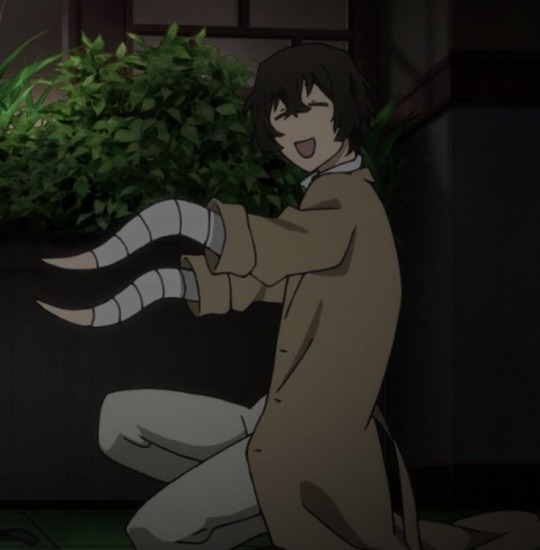
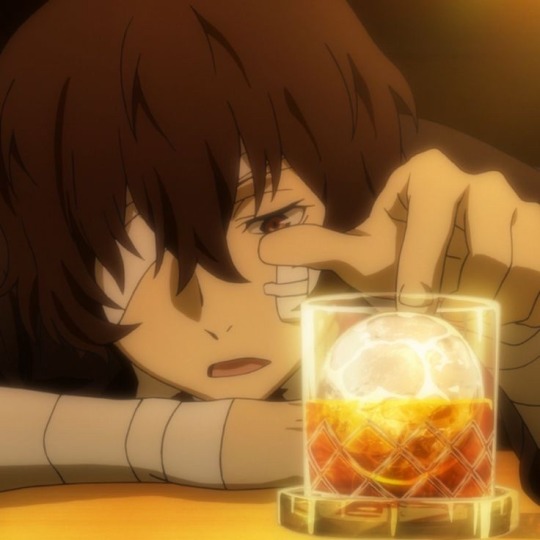
Dazai and his headphones are so important to me.. he seems to wear them frequently around the office. It could be noise cancelling or auditory stimulation that he likes.


The man never sits normally on a chair which is something I think a lot of neurodivergent people can relate to.

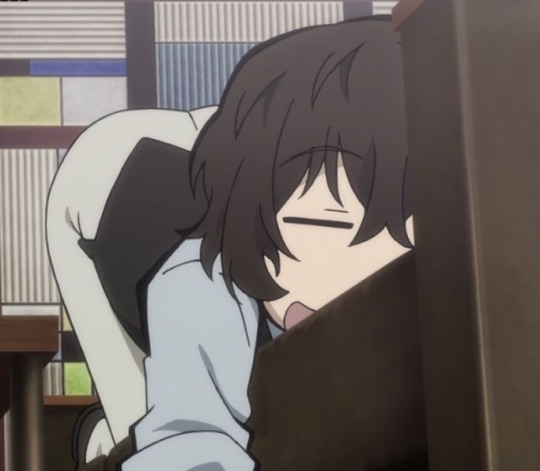
And of course floor time! Shown by him rolling around when stressed, laying on the rooftop and a few instances in Wan! like the marshmallow scene.
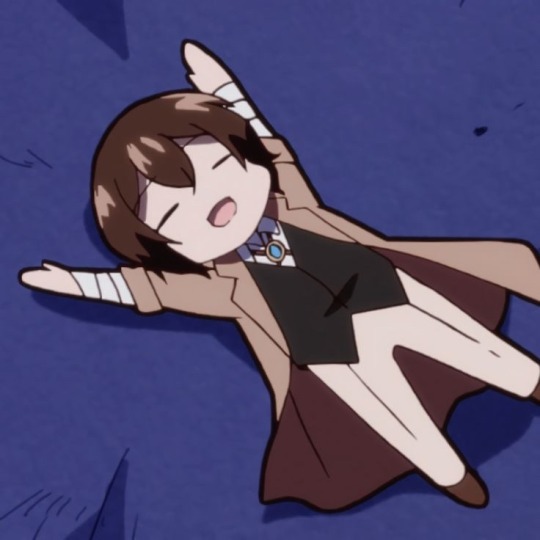

Also you can’t tell me that this is not two burnt out autistics after overworking their brains…


#there is probably so much more I haven’t included but here ya go#thank u for asking as you can tell I’m very autistic about him#bungou stray dogs#dazai#dazai osamu#bsd analysis#bsd#dazai is autistic#no longer human
70 notes
·
View notes
Text
the femininity of shani (what we can learn from pushya) 🌷

🌷 monica bellucci: pushya chandra
🌫️ The mystical tundra of Shani is often overlooked by its restricting feminine complexity and misconstrued for the nature of Buddha (the tantalizing serpent of Ashlesha). While their indirect submissive natures are similar in comparison, it is often natives of Mercury who use this explicit behavioral pattern for more materialistic, perhaps conniving, matters at hand. In this exploration of Shani’s ancient connection to divine femininity, I want to purposefully disclose that their submissive, seemingly “neutral” expressions are not the same. Buddha is the snake of binding to the collective for the intent of freedom and entangling or ensnaring their victim for the purpose of disempowering. Shani is the snake of binding to the contemporary nature of society for the intent of cooling the darkness of ego and empowering the higher collective. Buddha bestows the intelligence of the material aspects of the subversion into the intellect of worldly matters. However, Shani is the intelligence of the occult undertones which control the very essence of the material plane and the union of what is to come after we conquer the very shadows of the tenth house (the rashi of capricorn who will be the awakening of the realm, once we are released from Kali Yuga) to the hidden truths of the eleventh house, the supposed house of personal ties and fulfillment.
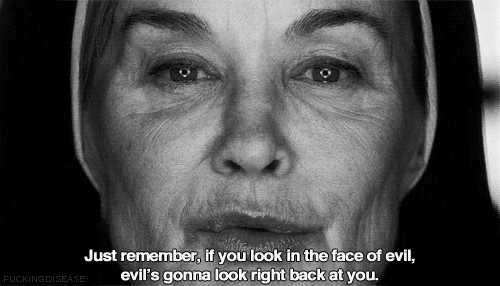
🌷 jessica lange: pushya lagna
☔️ There is a specific air of mystery around Shani and the graha’s corresponding nakshatras, bhavas and rashis. Much of the information provided is rather repetitively regurgitated from varying sources and of surface nature. My goal with this exploration is not to specifically delve in the expressional aspects of Shani, but to focus on the graha’s distinct involvement in the path of divine femininity. My hope is this exploration will awaken the serpent of knowledge within you, to explore the more niche archetypes within the vata umbrella that is Saturn.

🌷 miranda kerr: pushya lagna
⛩️ Vata dosha is most synonymous with cold, bereaved individuals who search this earthly plane longing for sustenance. It is the cold hands that seek to grasp the tangibility of spiritual words, it is the homeless widow who was once filled with wanderlust now bereaved, it is the drowsy feeling that surmounts when you look upon the rain beating down on your window pane. It is the dosha characteristic of the feelings we most disdain and wish to shy away from and simultaneously the realm of Shani, Chandra, and Rahu. We have heard the tales of the greedy, insatiable spirit of Rahu; the forgetful, lusting of Chandra; and the forever dried and cold spirit of Shani. Having repeatedly heard the rhetoric of these respective deities, a certain air of weariness has surrounded them respectfully. But you must continue to remind yourself of the necessity of attaining equilibrium and leaning into each graha’s meanings, teachings, and significances. If you are dominant in either of these vata grahas, know that you are more than the sterile or greedy archetype that has been placed upon you, as Kali (Shani) was equally as ferocious as she was creationist, Chhinnamasta (Rahu) was equally as violent as she was self-sacrificing, and Bhuvaneshvari (Chandra) is equally as intimidating as she is the supreme being of the earth, atmosphere, and heavens.

🌷 paris hilton: pushya chandra
🩸 In a similar fashion, the ethereal air of vata is equally as destructive as it is light, cool and dry. It governs all movement and processes in your mind and body (such as blood flow, breathing, and the coagulation of thoughts in your mind). This rulership of movement is why Shani is so astute and articulate within the realm of femininity. Shani is able to manipulate the vata element to attract and constrict around those we long to unite with. These elements of constriction are often associated with Ashlesha/Buddha, but significantly vary from each other.

🌷 gisele bundchen: pushya surya
🐍 Think of the Pushya nakshatra, the “Kula” star, resembling the flower of the snake gourd. Similar to Ashlesha, Pushya is also associated with serpentine movement. It is the maternal snake before it enters the stage of selfishness. It is focused on laying its cosmological eggs, whereas Ashlesha is the mother after this stage that abandons the cosmic eggs of Brihaspati (carefully crafted in Punarvasu) to never return or protect her young again. Ashlesha is leering into the gandanta knot spirituality of disempowering the collective, coiling up to rest in preparation for the spiritual shedding that awaits in Magha. Pushya is leering into the birthing of the collective itself. With the knowledge of vata dosha, Pushya is able to tap into previous experiences of destruction and coldness to relate to others. Using those previous experiences to further divulge into the mystified unknown that often longs to be hidden.

🌷 kate moss: pushya lagna
💒 This is why the cancer rashi is essential for developing cosmic energy and harnessing/wielding it. The cancer rashi is ruled by Chandra, of which is correlated to the Kamala Mahavidya (the vata being whose symbolism is comparable to that of Aphrodite or the Christian Mary). The primary “devastating” nature of vata is what sprouts fertility and purity, as the dirtiest mud will produce the freshest lotus. It is recommended in order to celebrate her, devotees engage in eating spicy, hot foods, as they ignite passion. These spices may include cinnamon, garlic, saffron, or chili peppers due to heavily spiced foods having the ability to bear this Mahavidya’s luscious energy. These same foods are associated with the vata Shani, in a similar fashion, Shani and Chandra are considered enemies but respectfully hold the cosmic keys to one another through the likes of Pushya and Shravana. The metaphor for the consumption of extreme vata spices that one earns the ability to celebrate and veneer the Mahavidya in her idealistic form is comparable to the narrative of sacrifice one must engage in to witness beauty (spiritually and physically). Aphrodite was offered sacrificial doves (bird’s being Shani’s primary vahana: vehicle) and smoky incense (smoke being ether in nature which is of vata dosha) in an attempt to receive love, fertility, and union. Whereas, the Virgin Mary was deemed pure due to her great sacrifice when she offered up the life of her Divine Son Jesus using her “Immaculate Heart” (similar to Kamala’s abundance in the anahata/heart chakra). In “A Prayer of Praise to the Blessed Virgin Mary” by St. Ephrem, he sang: “….Thou indeed art our only hope, most sure and sacred in God's sight, to whom be honor and glory, majesty and dominion, for ever and ever, world without end. Amen.”. Similar to Kamala, Aphrodite, and the Virgin Mary, so too must the masses work to earn the right to witness Shani’s femininity due to its premiere selectivity. This is why Pushya births the highest grossing models and revolutionary actresses in history [e.g. Halle Berry, Twiggy, Marlene Dietrich, Selena Gomez (who is now the most followed woman on Instagram) etc.], as the masses find pleasure in working to witness the mysticism vata bestows.

🌷 selena gomez: pushya surya and lagna
🍷 This mysticism is often deemed “odd”, “exotic” or “unique” and this is exactly where we can learn from the Mahavidya Kali. The darkened Mahavidya Kali breaks conventional stereotypes of feminine beauty and sexuality in Hindu goddess mythology. She serves as the dominant sexual partner straddling the prone Shiva (the master of poison and medicine, the great yogi, overlord of time, the cosmic dancer) and the wild warrior goddess drinking demon blood. She is originally depicted as a symbol of uncontrolled fury emerging from the fair, beautiful goddess Ambika (goddess of supreme power, energy and invincibility), in the battle with the demons in older Vedic texts. Thereafter, she gains independent existence both as the dark, mysterious and sexually demanding version of the more benign and auspicious Parvati and the primordial goddess power pre-dating the Hindu trinity of male gods, the Universal Mother Force which embraces both good and evil, gods and demons in the Kalika Purana. Unlike other texts which emphasize Kali's role in the battle against the demons, the Kalika Purana's focus is on her sexuality and her darkly sensual beauty. Equally it is on the heterodoxical rituals associated with her worship involving blood and flesh offerings, wine and the use of sexual intercourse as opposed to Vedic rituals.

🌷 dakota fanning: pushya chandra
❤️🔥 In Kalika Purana, Daksha’s daughter Sati, born fair, assumes the fearful visage of Kali and the other Mahavidyas to terrify Shiva into submission. At Daksha’s yagna, her father attributes her dark color to constant proximity to the wild-mendicant Shiva, causing her to give up her life in sorrow and humiliation. In the second portion of the Purana, she takes the dark and beautiful form of Parvati, similar to the appearance of a blue lotus. She was born to serve the gods’ purpose of luring into domesticity the stern, austere hermit-like Shiva to preserve the cosmic cycles of creation, preservation and destruction. It is only later, piqued and jealous of Shiva’s propensity towards fair-skinned goddesses that she emerges from her kosa (sheath) of darkness to become the golden-hued Gauri. Yet her darkly alluring and compelling sexuality is highlighted in the text as opposed to the prototype of a domesticated wife and mother like Candi in the Candi Mangal Kavya. John Stratton Hawley in his Prologue to “Devi: Goddesses of India”, noted that Kali in a strange way mediates between the transcendent goddess, the generic Devi who has supremacy over all forms of life and the consort goddesses like Lakshmi and Radha. Hawley wrote: “On the one hand, Kali unquestionably manifests herself as supreme—whether as a mother demanding submission or as an uncanny, uncontrollable force—but on the other hand, her supremacy is paradigmatically measured by the power she exerts over her consort the great god Shiva”. He detailed an example of her sexual dominance, the iconic representation of Kali dancing wildly on the prone, ithyphallic corpse of her husband Shiva. The Kalika Purana initially projects her as the manifestation of the universality of divine femininity, Mahamaya, who is Visnumaya and Rudrani consort of both Visnu and Rudra (Shiva). She is Savitri, Saraswati, through the power of her maya (illusion), incomprehensible to all who are ensnared in her power of illusion. She is Visnu’s Yoganidra, his state of cosmic sleep or stasis. She is Yogamaya/Mahamaya, who ensnares the cosmos in her web of illusion, she is Mahamoha, the fatal enchantress and the Supreme Trinity itself is not immune to her mysterious lure. Another goddess text, the Sri Lalita Sahasranama calls her Mahabhoga and Bhogini implying her rajasik-rupa (dynamism, also material grandeur) of being steeped in worldly luxuries. Yet she is the path to mukti (salvation) for beings trapped in the worldly and materialistic which is all part of her cosmic illusion. The Sri Lalita Sahasranama also states that she is Mohanasini, destroying the moha (bondage) of her devotees and Pasu-pasa-vimocini, releasing them from the inferior, coarser earthly bonds. She is Vidya (knowledge) for the householder who desires mukti (salvation), and Avidya (ignorance) who binds the universe in bonds of material desire. She is the primeval Demi-Urge, the Adyasakti that activates the inert maleness of Shiva into the dynamism of the Shiva-Sakti or Purusa-Prakrti union for without Sakti, Shiva is but a sava (corpse). Among the Sakta devotees it is Kali amongst the many manifestations of the divine feminine who is recognized as the Adya-murti, the original goddess manifestation. In the text, Kali alone can awaken the virility within Shiva, for on the one hand, she is a yogin to participate in his yoga and on the other, it is her eroticism, wild and uncontrolled, which is the perfect counterpart to his dominant sexual urges.
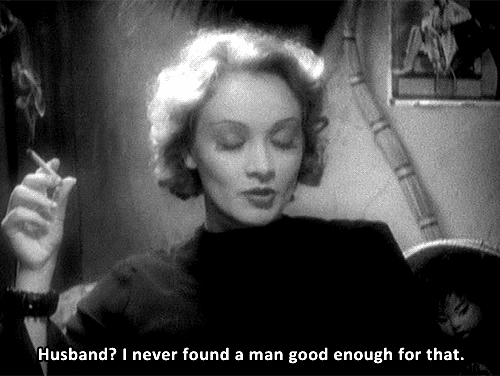
🌷 marlene dietrich: pushya chandra
🦶 Kali is feared in Hindu mythology as the negative stereotype in goddess cults and paradoxically revered as the Universal Mother. In a similar fashion, Pushya natives serve as the nourishing udder they are symbolized as, flowing with the golden knowledge of Brihaspati; yet their propensity for awakening occult knowledge and powers within their partners is hidden within the little knowledge the public has on this nakshatra. Kali’s iconic delineation, girded and garlanded with skulls and limbs while her hand is raised in the abhayamudra (gesture of reassurance from fear) indicates both chastisement and benediction. As a dark, complex, mysterious and alluring figure, she breaks conventional stereotypes of feminine beauty and sexuality, combining the beautiful with the fearful. Thus, explaining Pushya’s propensity for both embodying and challenging feminine stereotypes in the media (such as Paris Hilton’s hyperfemininity, Marlene Dietrich’s well-known portrayal for characters challenging the submissive standard of the 1900s, Halle Berry’s intimidatingly complex “Storm” character). In a traditionally patriarchal society and an androcentric religious order, Kali emerges as a rebel; dominant in marital and sexual relationships, ferocious, and bloodthirsty on the battlefield. Existing on the fringes of the dharmic value system and Vedic ritualism, the Kali-centric myths teeter dangerously on the extreme peripheries of social and moral acceptability in the iconic projection of her black nudity, voluptuous breasts, bloodstained, her foot on the prostrated corpse-like body of her consort Shive, and the sacrificial blood and flesh rituals associated with her worship.

🌷 angelina jolie: pushya lagna (note her films are wonderful examples of the nature of Pushya, from her Maleficent character’s sheep-like creature (the yoni of Pushya) to her dominatrix role, symbolizing the dark sexual subcultures of Shani in B*SM)
🍒 Kali conveys maya as seen from the “other shore”. She illustrates what the world of appearance looks like to the one who has seen beyond her overall presence (which is described as frightening) and her dwelling place lying within the cremation ground mocks the ultimate significance of a world grounded in the ego. In her “mad dancing, dishevelled hair and eerie howl, there is made present the hint of a world reeling, careening, out of control”. In conclusion, Kali, in integrating absolute binaries of the terrifying and the beautiful, the compassionate Mother and the blood-thirsty demon destroyer, the consort of Shiva and the sexually dominant partner draws a more comprehensive image of non-duality that is beyond the reductivist social and religious definitions of what is acceptable or what is heterodox. So too Pushyas embody life as it is in all its wild and abundant complexity, not as it is selectively made out to be within social and religious peripheries. They embody divine femininity in all its complexity; serving as the slivering synthesis of both the auspicious and benign goddesses, the wild, and uncontrolled. Like the Adyasakti, the primeval cosmic force, they represent both the good and the evil, the godly and the demonic of which the cosmos is composed, all of which arise from the intersection of the nakshatras in cancer rashi (as detailed above).
👄 It is important to note that the dominant female sexuality, the prolonging of intercourse in the Shiva-Shakti union, is not an exercise of power associated with the sexually dominant partner. Its ultimate purpose is the awakening of the dormant kundalini shakti (vital energy), which rises up the spine through the various chakras within us to culminate in the sahasrara (the thousand-petalled lotus) on the top of the head, the psycho-spiritual center. It envisages the path from pravritti (intense activity) to nivritti (cessation of desire) in this act of sacred sex. It defines a path of realization through indulgence without bondage (associated with Shani) to the senses (that of rahu/chandra), rather than through deprivation and denial of the sensory experiences. The myths and the cults of worship associated with Kali therefore strip life of its absolutes to envisage a more comprehensive and all-inclusive vision.
* all of these placements were found using astrotheme/.com and/or astro-charts/.com. it is important to note that some chandra (moon) placements may be off by up to 6 degrees and lagnas (ascendants/rising signs) as well, due to the fact that many websites do not have 100% accurate birth times for the given celebrities.
xoxo, angel 💋 (the beauty of ashwini is coming soon lovelies)
#vedicastrology#astrology#rahu ketu#nakshatras#moon#budha#mercury planet#chandra#pushya nakshatra#pushya#saturn
425 notes
·
View notes
Text
Autism Mod by yourfalsehope
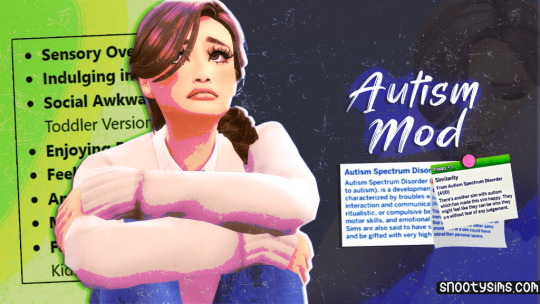
I really like this mod because I feel like it brings more awareness to autism and even though you may not understand it your sim will.
Creator's notes-
Autism spectrum disorder (ASD) is a complex developmental condition that involves persistent challenges in social interaction, speech and nonverbal communication, and restricted/repetitive behaviors. The effects of ASD and the severity of symptoms are different in each person.
ASD is usually first diagnosed in childhood with many of the most obvious signs presenting around 2-3 years old, but some children with autism develop normally until toddlerhood when they stop acquiring or lose previously gained skills. Autism is a lifelong condition.However, many children diagnosed with ASD go on to live independent, productive, and fulfilling lives.
What is Autism Spectrum Disorder? - American Psychiatric Association
What is Autism Spectrum Disorder? - CDC: Centers for Disease Control and Prevention
What You Get:
A Lifestyle CAS Trait for Child through Elder (Uses the Genius CAS Idle)
An Emotional CAS Trait for Toddlers (Uses the Inquisitive CAS Idle)
Occasional Events:
Sensory Overload: +3 for toddlers or +10 Tense Moodlet for Older
Indulging in Special Interest: +2 Happy Moodlet
Social Awkwardness: +2 Embarrassed Moodlet after being involved socially (Not Included in Toddler Version)
Enjoying Routine: +2 Happy Moodlet
Feeling Emotionless: +10 Fine Moodlet that decreases all other Emotion Moodlets x2
Anger Outburst: +3 for toddlers or +5 Angry Moodlet for Older - Can lead to a Meltdown
Meltdown: +5 Angry Moodlet that sometimes will trigger off an Anger Outburst.
Feeling Safe: +2 Happy Moodlet that decreases Stressed & Angry Emotions when playing in Kids Tent from DHD
Socials (Not Included in Toddler Version):
Enthuse about Special Interest
Thanks
Note: This is a Remake and Renovation of PieBaldFawn's original Autism Spectrum Disorder Trait. They chose to remove and retire it. I decided to recreate it since it is a very often used trait of mine and I enjoyed the added Realism.
Updates:
May 27, 2021: Fixed Trait Tuning pointed out by BetterExceptions
August 13, 2021: Added Friendly Social Enthuse About Special Interest to Non-Toddler Version
October 25, 2021: Added Feeling Safe Happy Moodlet that decreases Stressed & Angry Emotions when playing in Kids Tent from DHD for Toddler Version.
Please show love and support for this amazing mod and the amazing info left by the creator yourfalsehope.
download
#sims 4 download#sims 4 cc#sims 4 gameplay#sims 4#the sims 4#sims 4 custom content#sims 4 mods#the sims 4 mods#the sims 4 custom content#ts4#ts4 gameplay mods#ts4 gameplay#ts4 generations#sims 4 gameplay mods#s4 mods#s4cc#s4ccfinds#ts4 cc finds#ts4 cc download#ts4 custom content#the sims 4 cc#thesims4cc#ts4 cc
59 notes
·
View notes
Text
why i headcanon/see shidou kirisaki as autistic!!!
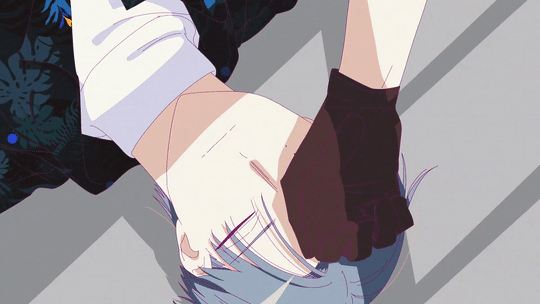
(note: i am not a medical professional, just an autistic person on the internet. all of my interpretations of his autism come from the lens of being autistic. you might see him completely differently and thats ok!)
autistic! shidou is a headcanon i hold very near and dear to me and talk about it. a lot. as such, i thought id compile some actual reasonings as to why i view him as autistic.
ill be using snippets from the dsm-5 in this post. i will be mainly using portal conversations as proof, because i feel like they are the most "casual" we can get the characters to be.
A. Persistent deficits in social communication and social interaction across multiple contexts
shidou has a very straightforward way of speaking and seems to ignore social rules of "politeness" a lot of the time, while still remaining pretty calm.
shidou also seems to have some sort of difficulty wording himself, and in almost every single portal conversation he trails in and out of sentences. the only characters who do this more than him are haruka and muu.
Shidou: That’s good…… You were crying so much, so I was concerned for you.
……yeah, I’m sure.
Your family will definitely be worrying about you.
I…… hope you can go back soon.
little snippet of what i mean, this amount of trailing off happens in pretty much every shidou portal conversation
shidou also is constantly misinterpreted by his facial language and his tone. on multiple occasions he is referred to as hard to approach, and so calm its "suspicious". characters are surprised when he smiles or is actually a nice person.
"Mu: Shidou-san…… did you come here to comfort me……?
I’m sorry, I’d thought you were…… a scary person…… fufu."
Kotoko: …… Shidou, right?
I’ve been watching your actions for a while, and I’m curious.
You’re always extremely calm, and your expression never changes.
Do you know something about this place?
Shidou: No, I know nothing.
……I’ve never really had an expressive face.
Despite appearances, I am quite shaken by this.
Mikoto: Also, I don’t give nicknames to [ ] the hard-to-approach types like Shidou-san.
he also seems to have difficulty holding conversations, as most portal conversations with him involve him trailing off, talking to himself (ex. with amane) or just like, not elaborating on what hes saying.
B. Restricted, repetitive patterns of behavior, interests, or activities
the repetitive patterns/behaviors is a little bit hard to determine, since they are in prison and not really acting like their "real selves" in terms of behavior. also, since milgram is a series mainly in voice dramas and music videos its kind of difficult to pinpoint any physical repeated behaviors.
when it comes to heavily focused interests, though, shidou seems to be completely obsessed with his work. although this could just be him being a workaholic, the amount of passion he had in it before milgram really reminds me of a special interest that has been pursued as a career.
he also seems very knowledgeable in other topics, such as being able to recite japanese criminal law from the top of his head. again, this could easily be interpreted as him just trying to learn the best way to argue for a death penalty but i dont really care this is my headcanon sooo.
in terms of sensory issues, shidou's issues with his hands could totally play into those. what is specifically wrong with his hands has never been stated: it could be nerve damage, sensory issues, or something else. i see it as a mix of sensory issues and some other underlying conditions.
Mikoto: By the way, I’ve been wondering for a while, but do you always wear those gloves?
Shidou: I don’t……
How to put it…… I suppose…… since I have my hands covered all the time, then when I take them off, it feels as though the feeling in my fingertips is even greater……
I know it’s probably all in my head…… but that’s how it feels.
in his trial 2 interrogation, he says he cant wear rings because they lessen the feeling in his fingertips. this could easily be sensory issues in his hands.
thats pretty much all i have to say regarding this!!! if it wasnt obvious this is just a silly headcanon thats mainly me projecting, but it does have basis in canon to a degree. shidou, with his easily misinterpreted tone and facial expressions and deep love for his interests just reminds me a lot of myself.
(btw if you like this headcanon i did write a fic of shidou getting diagnosed with autism if you wanna read it haha... shameless self promo)
#shidou kirisaki#milgram#analysis sort of not really#krav talks#i speedran this sorry guys i just wanted to get this out in the open#feel free to lmk any thoughts or questions you have regarding this
87 notes
·
View notes
Text

自閉症スペクトラムASD限定された反復する様式の行動興味活動こだわりお風呂の入り方決まった手順は小気味良く水好き接触性皮膚炎寛解せぬ自傷行為的感覚探求石鹸泡の体洗い,大人の発達障害アスペルガー/自閉スペクトラム症での就労B型ない日も夏場は冷水長め早朝シャワー光るもの好きで窓外街灯の欣幸
#snapseed#autism spectrum disorder#high functioning autism#restricted and repetitive behavior#bath time#soap foam#water obsession#fascinated by water#cold shower#self harm behavior#contact dermatitis#soap rash#sensory seeking behavior
3 notes
·
View notes
Note
Hi! My friend recommended your blog as a nice place for some research about Autism.
I've started to notice a few things and question if I could be autistic, but I wasn't able to find enough information about it while researching.
Do you have any info about how to identify autism in adults? It would help a lot 😊
Hi there,
I’ve found some resources. I’ll leave excerpts below. They are a bit long.
Common signs of autism in adults include:
* finding it hard to understand what others are thinking or feeling
* getting very anxious about social situations
* finding it hard to make friends or preferring to be on your own
* seeming blunt, rude or not interested in others without meaning to
* finding it hard to say how you feel
* taking things very literally – for example, you may not understand sarcasm or phrases like "break a leg"
* having the same routine every day and getting very anxious if it changes
Other signs of autism
You may also have other signs, like:
* not understanding social "rules", such as not talking over people
* avoiding eye contact
* getting too close to other people, or getting very upset if someone touches or gets too close to you
* noticing small details, patterns, smells or sounds that others do not
* having a very keen interest in certain subjects or activities
* liking to plan things carefully before doing them
Autism in women and men
Autism can sometimes be different in women and men.
Autistic women may:
* have learned to hide signs of autism to ‘fit in’ - by copying people who don’t have autism
* be quieter and hide their feelings
* appear to cope better with social situations
* show fewer signs of repetitive behaviours
This means it can be harder to tell you're autistic if you're a woman.
Common symptoms of autism in adults include:
* Difficulty interpreting what others are thinking or feeling
* Trouble interpreting facial expressions, body language, or social cues
* Difficulty regulating emotion
* Trouble keeping up a conversation
* Inflection that does not reflect feelings
* Difficulty maintaining the natural give-and-take of a conversation; prone to monologues on a favorite subject
* Tendency to engage in repetitive or routine behaviors
* Only participates in a restricted range of activities
* Strict consistency to daily routines; outbursts when changes occur
* Exhibiting strong, special interests
Autism spectrum disorder (ASD) is typically a life-long condition, though early diagnosis and treatment can make a tremendous difference.
Autism Symptoms in Adults at Home
Other peoples’ feelings baffle you. You have a collection of figurines on your desk that must be in the same order at all times. These, and other common manifestations of ASD, may be apparent in adults at home:
* Your family members lovingly refer to you as the “eccentric professor” of the family, even though you don’t work in academia.
* You’ve always wanted a best friend, but never found one.
* You often invent your own words and expressions to describe things.
* Even when you’re in a quiet place, like the library, you find yourself making involuntary noises like clearing your throat over and over.
* You follow the same schedule every day of the week, and don’t like unexpected events.
* Expressions like, “Curiosity killed the cat” or “Don’t count your chickens before they hatch” are confusing to you.
* You are always bumping into things and tripping over your own feet.
* In your leisure time, you prefer to play individual games and sports, like golf, where everyone works for themselves instead of working toward a common goal on a team.
Symptoms of ASD vary greatly from person to person based on the severity of the condition. These or similar manifestations of ASD may be apparent at work:
* When you’re having a conversation with your boss, you prefer to look at the wall, her shoes, or anywhere but directly into her eyes.
* Your co-workers say that you speak like a robot.
* Each item on your desk has a special place, and you don’t like when the cleaning company rearranges it to dust.
* You are really good at math, or software coding, but struggle to succeed in other areas.
* You talk to your co-workers the same way you talk with your family and friends.
* During meetings, you find yourself making involuntary noises, like clearing your throat over and over.
* When talking with your boss, you have difficulty telling if he is happy with your performance or mad at you.
In addition, autistic individuals may exhibit extraordinary talents in visual skills, music, math, and art. And roughly 40 percent of autistic individuals have average or above-average intelligence.
Some of the characteristics that adults with an autism diagnosis commonly report, include:
Communication
You may:
* Find joining in conversation difficult.
* Speak in a flat, monotone voice, or not speak.
* Have trouble relating to other people’s thoughts or emotions.
* Use repetitive language.
* Find it hard to read someone’s body language and emotions.
* Find that others don’t understand how you are feeling and say that “it is hard to know what you are thinking”.
* Dominate conversations and provide excessive information on the specific topics you are interested in.
* Find it easier to talk ‘at’ people, rather than engaging in a two-way conversation.
* Have trouble reading social cues.
* Find ‘small talk’ such as talking about the weather and what others are doing difficult.
* Take things literally. For example, if someone says ‘oh that’s a piece of cake’ or ‘you’re barking up the wrong tree’ you find it difficult to know what they mean.
* Be blunt in your assessment of people and things.
* Find it difficult to maintain eye contact when you are talking to someone.
* Have your own unique phrases and descriptive words.
* Find building and maintaining close friendships and relationships difficult.
* You may make faces that others find unusual.
* You may make gestures when speaking with people.
Behaviour
* You enjoy consistent routine and schedules and get upset or anxious should that routine or schedule be changed.
* You find it upsetting when something happens that you did not expect to happen.
* Have trouble regulating your emotional responses.
* Are bothered if your things are moved or rearranged by someone.
* Have a series of repetitive rituals or behaviours that you follow on a daily basis.
* You make noises in places where you are expected to be quiet.
* Preference for highly specific interests or hobbies that you spend a lot of time on.
* Have difficulty multi-tasking.
* Have a very strong reaction or no reaction at all to sensory stimuli, such as textures, sounds, smells and taste.
* Like operating solo – both at work and play.
I hope these sources help you. Thank you for the inbox. I hope you have a wonderful day/night. ♥️
79 notes
·
View notes
Text
Survey About Support Needs Labels
Hi all! I have autism with level 2 social-communication difficulties and level 3 restricted repetitive behaviors. I mostly post in Reddit MSN/HSN autism communities, but I was recently made aware of this community.
I like surveys a lot, and the Reddit communities that I'm in have recently had several surveys that touched on support needs labels. It got me thinking about what people mean when they say they have "low support needs" or "moderate support needs." For example, what kind of daily life support needs do people have? How is it affected by their autism symptoms? What about their overall support needs, taking into account co-occurring health conditions?
I created a survey to see what other people think! I'll share the results when I have them. I'm curious if Tumblr and Reddit autism communities tend to agree on support needs labels or if the different communities have different ideas of what the labels mean. I'm also really curious if people who are undiagnosed, those with level 1 diagnoses, and those with level 2 or 3 diagnoses (or those from countries that don't use the level system but have LSN compared to MSN/HSN) all respond differently. I'd really appreciate if people could take the survey and especially if you could also show it to people that you know!
If you already took the survey on Reddit, you don't need to retake it here (it's a different link but the same questions), but I'd still appreciate you reblogging it!
Thank you!
#autism#actuallyautistic#low support needs#medium support needs#high support needs#level 1 autism#level 2 autism#level 3 autism
109 notes
·
View notes
Text
Diagnostic Criteria for Allism Spectrum Disorder
also known as, Neurotypical Disorder
(Parody)
To meet diagnostic criteria for Allism Spectrum Disorder according to DSM-5, a child must have persistent deficits in each of three areas of social communication and interaction (see A.1. through A.3. below) plus at least two of four types of restricted, repetitive behaviors (see B.1. through B.4. below).
A. Persistent deficits in direct, honest, and compassionate social interaction and patterns of using deception and manipulation of others perception. Deficits persist across multiple contexts, as manifested by the following, currently or by history (examples are illustrative, not exhaustive; see text):
Deficits in social-emotional reciprocity. For example,
a. Indirect, ambiguous, or deceptive communication style,
b. Over dependence on social norms and generalizations,
c. Frequently superimposes subtext or places unfounded meaning on concrete, literal, or factual communication,
d. Struggles with comprehending consent and personal boundaries in social interaction.
Deficits in verbal and nonverbal communicative behaviors used for social interaction. For example,
a. Ritualized use of unusual or menial conversation topics (e.g. comments on weather),
b. Pervasive passive aggressive communication style (saying “that’s different” when really meaning “I don’t like that”),
c. An excessive use of eye contact, abnormalities in body language, and deficits in understanding and use of gestures.
Deficits in theory of mind and developing, maintaining, and understanding autistic relationships. For example,
a. Difficulties adjusting behavior to suit various social contexts,
b. Inappropriate or undesired responses in conversation (e.g. using repeated passive/apathetic responses to end a conversation, visible discomfort when your interests or opinions vary from theirs),
c. Absorption in perceived social status “ranking”,
d. Deficit in comprehending bodily autonomy and personal space,
e. Restrictive fixation with and dependence on gender social constructs,
f. Repeatedly engages in tribalistic behaviors, such as compulsive attempts to control reputation in groups, and exploiting, marginalizing, or punishing groups deemed unworthy or inferior.
Severity is based on social communication impairments and impairment in organized, specialized behavior. For either criterion, severity is described in 3 levels: Level 3 – requires very substantial support, Level 2 – Requires substantial support, and Level 1 – requires support.
B. Patterns of over-dependence on heuristics, social norms, and generalizations in behavior, interests, or activities, as manifested by at least two of the following, currently or by history (examples are illustrative, not exhaustive; see text):
Stereotyped or repetitive verbalization, use of objects, or speech. e.g.,
a. Simple motor stereotypes,
b. Repetitive vocal stimming via verbalizing unfiltered thoughts or patterns of erroneous intonation
c. Recreating social scenarios with toys or objects as children,
d. Repetitive use of involuntary scripted phrases (e.g. “Lets hang out soon”, “How are you”, “Long time no see”, or “It’s nice to meet you”).
Insistence on sameness, extreme adherence to pre-existing social norms, or ritualized patterns of verbal or nonverbal behavior. e.g.,
a. Ritualized use of indirect communication,
b. Strong attachment to group identity, rigid thinking patterns, greeting rituals,
c. Need to conform,
d. Difficulty in challenging pre-existing constructs in the world,
e. Gullible to group biases such as bandwagon effect, groupthink, or status quo bias.
Lack of specialization or pattern-recognition that is abnormal in apathy or disorderliness. e.g.,
a. numerous superficial, shallow hobbies and interests with deficit in or complete lack of deeper exploration of interests,
b. selecting interests based on social group or social influence,
c. utilizing interests as social currency without genuine passion,
d. ignoring small details because they do not align with expectations, context, or pre-existing beliefs,
e. overly concerned with social perception instead of concrete objects or information.
Dulled or hyporeactive to sensory input or information that does align with pre-existing knowledge, beliefs, or self-interest. e.g.,
a. ”tuning out” sounds in environment deemed unimportant,
b. easily influenced to interpret information based on how information is presented,
c. overly gullible to confirmation bias, halo effect, and attentional bias,
d. restrictively applyies existing social constructs as rules/expectations for all interaction and modelling of instead of generating beliefs based on sensory input and pattern recognition.
Specify current severity:
Severity is based on social communication impairments and restricted, repetitive patterns of behavior. (See table below.)
C. Symptoms must be present in the early developmental period (but may not become fully manifest until their behavior becomes intolerable to autistics).
D. Symptoms cause clinically significant impairment in social, occupational, or other important areas of current functioning.
E. These disturbances are not better explained by intellectual disability (intellectual developmental disorder) or global developmental delay. Intellectual disability and allism spectrum disorder frequently co-occur; to make comorbid diagnoses of allism spectrum disorder and intellectual disability, communication should be below that expected for general developmental level.
Note: Individuals with a well-established DSM-IV diagnosis of allism disorder, neurotypical disorder, or pervasive developmental disorder not otherwise specified should be given the diagnosis of allism spectrum disorder. Individuals who have marked deficits in social communication, but whose symptoms do not otherwise meet criteria for allism spectrum disorder, should be evaluated for social (pragmatic) communication disorder.
#double empathy problem#allistics#neurotypical#asd#autism#neurodivergent#actually autistic#audhd#autistic#neurodivergence#medicalization#dsm#dsm 5#allism#allistic awareness#double empathy#moomatahiko#naominoop#naominoop art
411 notes
·
View notes
Text
being autistic and avoidant
i've noticed that both my avoidant personality and my autistic neurology impact each other greatly. still, even though it's one of the more frequent personality diagnoses alongside autism, i don't really see anyone talk about what being an avoidant autistic is like.
that being said, here are a few ways i notice they interact in my personal experience:
cognitive empathy
a major part of both disabilities are their impacts on cognitive empathy. autism often causes people to avoid assuming others' thoughts and feelings, while avoidants tend to assume these feelings are negative and personal.
before i developed my avoidant personality, i fell into the latter category. people could be blatantly unhappy and i'd just...assume things were fine.
at this point, however, my avoidant perspective-taking has definitely become my main thought process. i always feel like people hate me or what i'm doing or just generally aren't in the mood to deal with me.
i wouldn't say that i "have cognitive empathy" now, but moreso that i'm too focused on avoiding rejection to not be constantly assume the worst.
self-esteem
another part of avoidant personality is the idea that you're socially inept, regardless of evidence. being autistic complicates this since--by definition--all autistic people would be considered "socially inept" by society.
this makes it difficult to know when autistic self-awareness ends and avoidant self-deprecation begins. am i incapable of [social thing] because i'm autistic, or because i simply don't believe i am?
at points, i've questioned my autism due to this. like, maybe i'm just exaggerating; i've seen allistic avoidants mistake it for autism before, as well.
however, others' perspectives and my significant restrictive/repetitive behavior makes it clear that it's not just me.
self-direction
my ability to manage myself is impacted by both my autism and my avoidance.
on the one hand, autism gives me executive dysfunction, autistic inertia, and rituals that are rigid to the point of self-sabotage.
but on the other hand, being avoidant makes me too self-conscious to take care of myself easily, namely considering that i don't live alone, thus am in a constant state of social vigilance.
for example, i've yet to learn how to cook.
one issue is that i've gotten so used to the routine of having food made for me that it's triggering to be suddenly encouraged to change, but another is that i'm afraid of the attention taking any initiative would bring.
i don't believe i'd be shamed for it, but being avoidant makes any attention feel intimidating to me; it's not purely a fear of criticism, but generally a fear of recognition (which is ironic considering that i'm also a narcissist, making me very attention-seeking, as well).
social skills
not only does being avoidant impact how i think of my social abilities, but also how i utilize them.
being alexithymic, it can be hard to understand even my own motivations in things. at points, i can't tell if i'm being quote/unquote "socially inept" because i can't understand the situation or because i simply don't want to make any moves.
for example, i almost never make eye contact with others. i originally thought of this as part of my autism, but i honestly can't tell if it's that or my avoidant personality.
on the one hand, eye contact is sincerely overwhelming, but on the other, i can easily do it with animals, fictional characters, and my own reflection. i also made eye contact pre-avoidance. maybe i'm simply too afraid of the intimacy, not actually sensory-sensitive to it?
in other situations, it can be a mixture of both autism and avoidance.
for example, i tend to avoid initiating conversations. i don't want to draw attention to myself or risk rejection, but i also genuinely don't know how i'm expected to start a conversation at all.
external perceptions
i've been told that my social anxiety is obvious, but not my autism. if most people knew what avoidant personality was, i assume i'd probably be recognized as outright avoidant very easily.
pretty much everyone considers me withdrawn in some way. i've been called quiet, indecisive, easy (as in "passive"), reserved, and various similar words.
in some cases, this works in my favor. there have been situations where people have treated me even friendlier than they do others because they see me as fragile.
in many other cases, this works against me; people avoid me because i'm too withdrawn for their tastes. this enables my avoidant behavior, as it affirms--and partially caused--my belief that no one could actually want to be around me.
in other cases, people don't see me as anxious, but just emotionally cold. people have sometimes questioned if i hated them or was angry with them due to my behavior. however, this is typically due to explicitly autistic behavior rather than anything avoidant.
apparently, people also see me as somewhat eccentric. my mom described it once as "the many quirks of ian." i'm not fully aware what these quirks are, but they're there.
47 notes
·
View notes